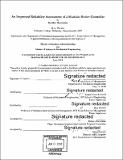An improved reliability assessment of a modular robot controller
Author(s)
Hausladen, Heather
DownloadFull printable version (12.78Mb)
Other Contributors
Leaders for Global Operations Program.
Advisor
Kamal Youcef-Toumi and Roy Welsch.
Terms of use
Metadata
Show full item recordAbstract
Modular industrial robot systems are well suited for high performance-accuracy, repeatability and speed, or shorter cycle times. Additionally, modular architecture supports flexibility. Modular robot systems are easily adaptable to a wide range of customer applications. A third characteristic of the robot system-reliability-is becoming increasingly important as industrial manufacturing processes and products increase in complexity and the costs associated with robot failure such as production line downtime increase. This project melds new advances in physics of failure science for electrical components with traditional industrial reliability engineering tools. The author develops three modelling approaches for a robot controller drive system. A function block diagram, highlights the main functions in the drive and their interdependencies. Reliability block diagrams estimate the reliability of controller drive system hardware. Finally, a predictive maintainability model is developed to illustrate future use of reliability model results for real-time monitoring in robot service applications. This final model is created by adding physics of failure models at the component level to the system-level reliability models developed earlier in the thesis. The result is twofold. 1) An improved estimate of hardware module reliability and its sensitivity to the selection of components and circuit designs. 2) A new framework to monitor and predict hardware wear-out in real-time. The author identifies simple, quality metrics such as reliability and availability. These metrics are intimately connected to the customer experience. Additionally, this thesis outlays how to translate these customer-driven metrics back into measurable quality targets upstream in the value chain. This creates an integrated approach to quality across the robot system value chain. With these results, this thesis impacts tangible improvements across multiple dimensions: customer satisfaction, field service planning and investment, new product introduction projects, and next generation product design to support industry 4.0.
Description
Thesis: M.B.A., Massachusetts Institute of Technology, Sloan School of Management, in conjunction with the Leaders for Global Operations Program at MIT, 2018. Thesis: S.M., Massachusetts Institute of Technology, Department of Mechanical Engineering, in conjunction with the Leaders for Global Operations Program at MIT, 2018. "June 2018." Cataloged from PDF version of thesis. Includes bibliographical references (pages 88-90).
Date issued
2018Department
Leaders for Global Operations Program at MIT; Massachusetts Institute of Technology. Department of Mechanical Engineering; Sloan School of ManagementPublisher
Massachusetts Institute of Technology
Keywords
Sloan School of Management., Mechanical Engineering., Leaders for Global Operations Program.